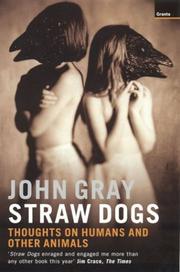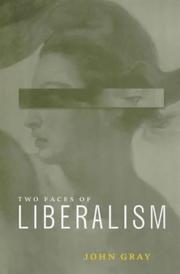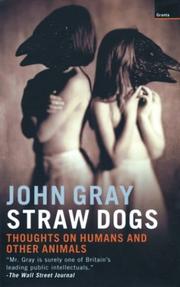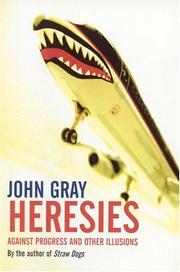| Listing 1 - 10 of 10 |
Sort by
|

ISBN: 1862075964 9781862075962 Year: 2003 Publisher: London : Granta Books,
Abstract | Keywords | Export | Availability | Bookmark
 Loading...
Loading...Choose an application
- Reference Manager
- EndNote
- RefWorks (Direct export to RefWorks)
A radical work of philosophy, which sets out to challenge our most cherished assumptions about what it means to be human. From Plato to Christianity, from the Enlightenment to Nietzsche and Marx, the Western tradition has been based on arrogant and erroneous beliefs about human beings and their place in the world. Philosophies such as liberalism and Marxism think of humankind as a species whose destiny is to transcend natural limits and conquer the Earth. Even in the present day, despite Darwin's discoveries, nearly all schools of thought take as their starting point the belief that humans are radically different from other animals. John Gray argues that this humanist belief in human difference is an illusion and explores how the world and human life look once humanism has been finally abandoned.
Humanism. --- existentialisme --- Histoire de la pensée économique --- Individu et société --- Humanism

ISBN: 0745622585 0745622593 Year: 2000 Publisher: Oxford : Polity Press,
Abstract | Keywords | Export | Availability | Bookmark
 Loading...
Loading...Choose an application
- Reference Manager
- EndNote
- RefWorks (Direct export to RefWorks)
Book
ISBN: 9780691157429 Year: 2013 Publisher: Princeton : Princeton University Press,
Abstract | Keywords | Export | Availability | Bookmark
 Loading...
Loading...Choose an application
- Reference Manager
- EndNote
- RefWorks (Direct export to RefWorks)
Isaiah Berlin (1909-1997) was the greatest intellectual historian of the twentieth century. But his work also made an original and important contribution to moral and political philosophy and to liberal theory. In 1921, at the age of eleven, Isaiah Berlin arrived in England from Riga, Latvia. By the time he was thirty he was at the heart of British intellectual life. He has remained its commanding presence ever since, and few would dispute that he was one of Britain's greatest thinkers. His reputation extends worldwide--as a great conversationalist, intellectual historian, and man of letters. He has been called the century's most inspired reader. Yet Berlin's contributions to thought--in particular to moral and political philosophy, and to liberal theory--are little understood, and surprisingly neglected by the academic world. In this book, they are shown to be animated by a single, powerful, subversive idea: value-pluralism which affirms the reality of a deep conflict between ultimate human values that reason cannot resolve. Though bracingly clear-headed, humane and realist, Berlin's value-pluralism runs against the dominant Western traditions, secular and religious, which avow an ultimate harmony of values. It supports a highly distinctive restatement of liberalism in Berlin's work--an agnostic liberalism, which is founded not on rational choice but on the radical choices we make when faced with intractable dilemmas. It is this new statement of liberalism, the central subject of John Gray's lively and lucid book, which gives the liberal intellectual tradition a new lease on life, a new source of life, and which comprises Berlin's central and enduring legacy. In a new introduction, Gray argues that, in a world in which human freedom has spread more slowly than democracy, Berlin's account of liberty and basic decency is more instructive and useful than ever.
Political science --- Philosophy --- Berlin, Isaiah, --- Administration --- Civil government --- Commonwealth, The --- Government --- Political theory --- Political thought --- Politics --- Science, Political --- Social sciences --- State, The --- Berlin, Yeshaʻyah, --- Berlin, Yeshaʻyahu, --- Берлин, Исайя, --- Berlin, Isaĭi︠a︡, --- ברלין, ישעיהו --- Birlīn, Īzāyā, --- برلين، ايزايا

ISBN: 1862075123 Year: 2002 Publisher: London : Granta books,
Abstract | Keywords | Export | Availability | Bookmark
 Loading...
Loading...Choose an application
- Reference Manager
- EndNote
- RefWorks (Direct export to RefWorks)

ISBN: 1862077185 Year: 2004 Publisher: London : Granta Books,
Abstract | Keywords | Export | Availability | Bookmark
 Loading...
Loading...Choose an application
- Reference Manager
- EndNote
- RefWorks (Direct export to RefWorks)
Book
ISBN: 9781847081322 1847081320 Year: 2009 Publisher: London : Granta,
Abstract | Keywords | Export | Availability | Bookmark
 Loading...
Loading...Choose an application
- Reference Manager
- EndNote
- RefWorks (Direct export to RefWorks)
Book
ISBN: 9780415567855 Year: 2010 Publisher: London : Routledge,
Abstract | Keywords | Export | Availability | Bookmark
 Loading...
Loading...Choose an application
- Reference Manager
- EndNote
- RefWorks (Direct export to RefWorks)
Liberalisms, a work first published in 1991, provides a coherent and comprehensive analytical guide to liberal thinking over the past century and considers the dominance of liberal thought in Anglo-American political philosophy over the past 20 years. John Gray assesses the work of all the major liberal political philosophers including J. S. Mill, Herbert Spencer, Karl Popper, F. A Hayek, John Rawls and Robert Nozick, and explores their mutual connections and differences.
Book
ISBN: 0255362714 9780255362719 Year: 1992 Publisher: London : IEA health and welfare unite,
Abstract | Keywords | Export | Availability | Bookmark
 Loading...
Loading...Choose an application
- Reference Manager
- EndNote
- RefWorks (Direct export to RefWorks)
Book
ISBN: 2251449914 9782251449913 Year: 2019 Publisher: Paris les Belles lettres
Abstract | Keywords | Export | Availability | Bookmark
 Loading...
Loading...Choose an application
- Reference Manager
- EndNote
- RefWorks (Direct export to RefWorks)
Chiens de paille est une charge radicale contre notre humanisme libéral. Mettant à mal nos certitudes les plus chères et nos croyances les plus salvatrices, John Gray y dissèque la façon dont nous portons un regard inepte sur un monde que nous ne pouvons sauver et qui n'a nul besoin de l'être.
Book
ISBN: 9782743663445 2743663448 Year: 2024 Publisher: Paris impr. en Espagne Éditions Payot & Rivages
Abstract | Keywords | Export | Availability | Bookmark
 Loading...
Loading...Choose an application
- Reference Manager
- EndNote
- RefWorks (Direct export to RefWorks)
Animalité (philosophie) --- Chats --- Philosophie
| Listing 1 - 10 of 10 |
Sort by
|

 Search
Search Feedback
Feedback About UniCat
About UniCat  Help
Help News
News